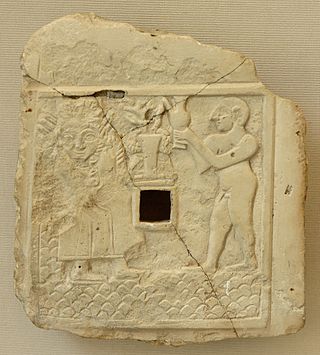
A libation is a ritual pouring of a liquid, or grains such as rice, as an offering to a deity or spirit, or in memory of the dead. It was common in many religions of antiquity and continues to be offered in cultures today.

Kwame Kwei-Armah is a British actor, playwright, director, singer and broadcaster. He is best known for playing paramedic Finlay Newton in the BBC medical drama Casualty from 1999 until 2004. In 2005 he became the second black Briton to have a play staged in the West End of London. Kwei-Armah's award-winning piece Elmina's Kitchen transferred to the Garrick Theatre in 2005. He was appointed Officer of the Order of the British Empire (OBE) in the 2012 Birthday Honours for services to drama. He is currently the artistic director of the Young Vic theatre in London, succeeding David Lan.
The Ga-Dangbe, Gã-Daŋbɛ, Ga-Dangme, or GaDangme are an ethnic group in Ghana, Togo and Benin. The Ga and Dangbe people are grouped respectively as part of the Ga–Dangme ethnolinguistic group. The Ga-Dangmes are one ethnic group that lives primarily in the Greater Accra of Ghana. Ethnic Ga family names (surnames) include Nikoi, Amon, Kotey, Kotie, Adei, Kutorkor, Oblitey, Lartey, Nortey, Aryee, Poku and Lamptey. The following are names derived from the ethnic Dangme and common among the Ningos Nartey, Tetteh, Kwei, Kweinor, Kwetey, Narteh, Narh, Dugbatey, Teye, Martey, Addo, Siaw, Saki, Amanor, Djangba. These are aligned to the ethnic Ga as well: Lomotey, Tetteh, Ankrah, Tetteyfio, Laryea, Ayitey, Okai, Bortey, Quaye, Quaynor, Ashong, Kotei, Sowah, Odoi, Ablor, Adjetey, Dodoo, Darku and Quartey.

Ayi Kwei Armah is a Ghanaian writer best known for his novels including The Beautyful Ones Are Not Yet Born (1968), Two Thousand Seasons (1973) and The Healers (1978). He is also an essayist, as well as having written poetry, short stories, and books for children.

The Beautyful Ones Are Not Yet Born is the debut novel by Ghanaian writer Ayi Kwei Armah. It was published in 1968 by Houghton Mifflin, and then republished in the influential Heinemann African Writers Series in 1969. The novel tells the story of an unnamed man who struggles to reconcile himself with the reality of post-independence Ghana.
Ato Sekyi-Otu is a Ghanaian political philosopher. He was born at Saltpond, Ghana in 1941 and until 1971 was known as Daniel Sackey Walker. He was educated at Mfantsipim School, Cape Coast, where he was Head Prefect in 1960-61 and completed his Cambridge Higher School Certificate in 1961 with distinctions in Greek and Latin. He went to Harvard and received an A.B. in Government in 1966. He pursued graduate studies at the University of Toronto where he worked with the renowned Canadian political theorist C.B. Macpherson and received his PhD in 1971.
Mildred Kiconco Barya is a writer and poet from Uganda. She was awarded the 2008 Pan African Literary Forum Prize for Africana Fiction, and earlier gained recognition for her poetry, particularly her first two collections, Men Love Chocolates But They Don't Say (2002) and The Price of Memory: After the Tsunami (2006).
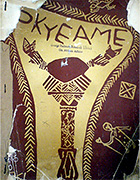
Okyeame was a literary magazine founded by the Ghana Society of Writers in the post-Independence era, which saw the rapid rise of a new generation of thinkers, writers and poets in the country. The first issue of Okyeame appeared in 1960, and issues were published, at irregular intervals, up until 1972. Inspired by Kwame Nkrumah, the first Prime Minister of Ghana, the publication sought to explore the experiences of Africa from a new intellectual framework. Writers published in the magazine include its first editor Kofi Awoonor, Efua Sutherland, Ayi Kwei Armah and Ama Ata Aidoo.

Jane Naana Opoku-Agyemang is a Ghanaian academic and politician who served as Minister for Education from February 2013 to January 2017. She is a full professor of literature. She served as the first female Vice-Chancellor of a state university in Ghana when she took over as Vice-Chancellor of University of Cape Coast. She currently serves as the Chancellor of the Women's University in Africa.

Robert Fraser FRSL is a British author and biographer.
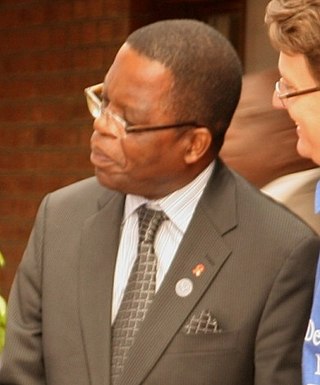
Ken Diston Lipenga is a Malawian politician, journalist, and writer. He was the Member of Parliament for Phalombe East from 1997 to 2014. He has served in various ministerial positions.
Benjamin Kwakye is a Ghanaian novelist and lawyer. His first novel, The Clothes of Nakedness, won the 1999 Commonwealth Writers' Prize, best first book, Africa, and has been adapted for radio as a BBC Play of the Week. His novel The Sun by Night won the 2006 Commonwealth Writers' Prize, Best Book Africa. His novel The Other Crucifix won the 2011 IPPY award. His is also the winner of the 2021 African Literature Association's Book of the Year Award for Creative Writing.
Ode Ogede is a Nigerian-born American academic who is professor of African literature and was a lecturer at Ahmadu Bello University.
B. Kojo Laing or Bernard Kojo Laing was a Ghanaian novelist and poet, whose writing is characterised by its hybridity, whereby he uses Ghanaian Pidgin English and vernacular languages alongside standard English. His first two novels in particular – Search Sweet Country (1986) and Woman of the Aeroplanes (1988) – were praised for their linguistic originality, both books including glossaries that feature the author's neologisms as well as Ghanaian words.

The Beautyful Ones Are Not Yet Born is a jazz album by Branford Marsalis, leading a trio with Jeff "Tain" Watts and Robert Hurst and with guest appearances from Wynton Marsalis and Courtney Pine. It was recorded May 16–18, 1991, at CTS Studio A, Wembley, England, and June 24, 1991, at RCA Studio B in New York, New York. It peaked at number 3 on the Top Jazz Albums chart.
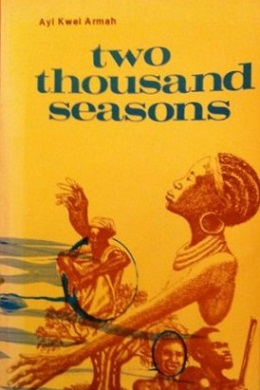
Two Thousand Seasons is a novel by Ghanaian novelist Ayi Kwei Armah. The novel was first published in 1973 and subsequently published a number of times, including in the influential Heinemann African Writers Series. It is an epic historical novel, attempting to depict the last "two thousand seasons" of African history in one narrative arc following a Pan-African approach.

Ayesha Harruna Attah is a Ghanaian-born fiction writer. She lives in Senegal.
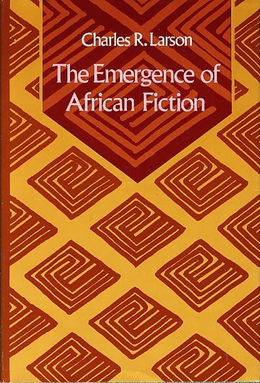
The Emergence of African Fiction is a 1972 academic monograph by American scholar Charles R. Larson. It was published initially by Indiana University Press, and again, in a slightly revised edition, in 1978 by Macmillan. Larson's study has elicited very different responses: it was praised as an early and important book in the study and appreciation of African literature in the West, but for others it remained stuck in a Eurocentric, even colonizing mode in which Western aesthetics were still the unspoken standard for artistic assessment.
The Healers is a novel by Ayi Kwei Armah. It was Armah's fifth novel which was published in 1979.
Ghanaian literature is literature produced by authors from Ghana or in the Ghanaian diaspora. The tradition of literature starts with a long oral tradition, was influence heavily by western literature during colonial rule, and became prominent with a post-colonial nationalist tradition in the mid 20th century. The current literary community continues with a diverse network of voices both within and outside the country today, including film, theatre, and modern digital formats such as blogging.












